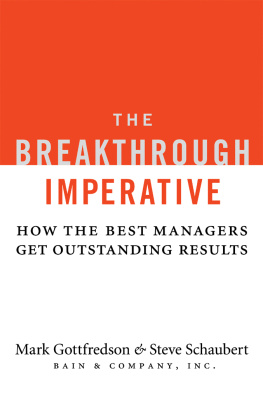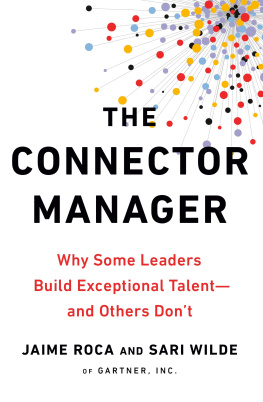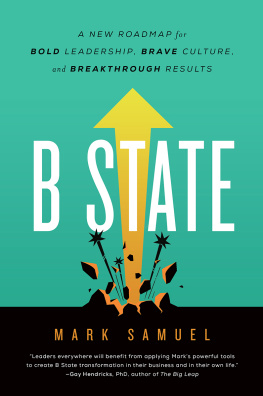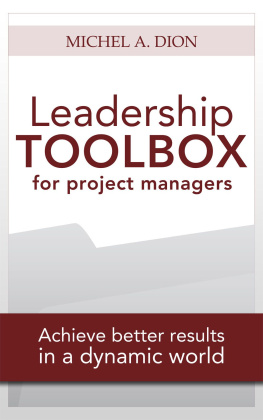We dedicate this book to the clients we have each served for more than twenty-five yearsmen and women who applied their unique managerial styles and skills with insight, courage, and commitment.
MARK GOTTFREDSON
AND STEVE SCHAUBERT
WE HAVE BEEN HUMBLED AND INSPIRED BY THE PROCESS OF BUILDING this book. Our initial ideato codify the fundamentals of dramatic performance improvement and tell the stories of top managers who have put those fundamentals to work with resounding resultsseemed straightforward enough.
But the process of analyzing a broad set of company results to identify top organizations and their managers became a revelation. Clearly, todays general managers in all types of organizations are up against increasingly formidable odds when they tackle a turnaround or attempt to transform operations. Customer needs are changing faster than ever before. Globalization and geopolitics have added risk and complexity to basic decisions, such as where to procure raw materials, assemble product, and recruit talent. Emerging economies are fostering new competitors with cost positions that are challenging organizations worldwide to remain competitive. And the general manager has less time than ever before to make his or her markabout three years. In this context, the organizations that rose to the top, and the managers who powered them, are even greater heroes than we initially believed. So first and foremost, we thank those we interviewed for sharing their journeys. Your stories are an invaluable guide to us and to others.
We also want to thank another set of heroes: our colleagues at Bain & Company who have probed and studied many of the fundamentals that have become a top managers four laws. A special thanks to Chris Zook, Bain author of three growth strategy books Profit from the Core ; Beyond the Core ; and Unstoppable for his careful review of our own efforts and helpful suggestions. His insights on costs, customers, and the quest for profitable growth inform aspects of all of our laws. We also thank Vijay Vishwanath, the father of High Road, Low Road thinking on market share and brand strategy, first captured in the 1997 Harvard Business Review article Your Brands Best Strategy. This thinking informs our second law. Rob Markey has given us extremely valuable input on the intricacies of customer segmentation strategies and tactics, and we are grateful for his contributions.
We thank our chairman Orit Gadiesh and former colleague Jim Gilbert for their work elucidating Bains thinking on profit pools, which appeared in two Harvard Business Review articles in 1998 and underpins our third law. Thanks to Keith Aspinall, a coauthor of the 2005 Harvard Business Review feature Innovation vs. Complexity, the basis of our fourth law. And to Paul Rogers and Marcia Blenko, authors of the Harvard Business Review feature Who Has the D? for their thinking on stripping the complexity out of organizational processes and decision making.
Loyalty guru and Bain fellow Fred Reichhelds metric for, and approach to, creating advocates among customersthe Net Promoter Scoreforms an important part of diagnosing your companys point of departure, the topic of chapter 6. And colleagues Todd Senturia, Lori Flees, and Manny Maceda have dedicated significant energy codifying our approach to change management, which appears in chapter 8.
Jeff Bradach and Nan Stone, our confreres at the Bridgespan Group, Bains sister consultancy to nonprofits, helped us identify relevant organizations to study in the nonprofit sector.
Truly, we stand on the shoulders of giants.
Also, special thanks to our team of researchers and editors who captured the findings and stories. In particular, we thank researchers Tony Horsley, Genia Jacques, Eric Lee, and research director Kath Tsakalakis, all of whom supported the project throughout its development (in some cases, for several years). Working alongside them for significant stretches were Blake Apel, Riccardo Bertocco, Erin Billman, Adam Burgh, Melissa Burke, Angela Chou, Simoina Dargan, Emilia Fallas, Stephen Garrison, Michael Heinrich, Wren Kabir, Angeliki Kasi, Brandon Luna, Maggie McArthur, Jesse Stuckey, Molly Tapias, Ben Tseng, Eric Weiner, and Chris Wolfe. Thank you all.
We also thank our editorial team, including our agent, David Miller, who guided our book proposal and found it a good home, and John Case, whose writing brought both the laws and the stories to life. Bains publisher Katie Smith Milway guided the manuscripts development with our publisher HarperCollins; our core team at HarperCollins, including editor Ethan Friedman and marketing director Angie Lee, gave us good counsel along the way. Bains quality control team shouldered the critical task of checking every fact and quote, and we thank managing editor Elaine Cummings, manuscript editors Maggie Locher and Jitendra Pant, fact checker Cassidy Healzer, editorial assistants Samantha Peck and Megan Miller, and the Bain Capability Center.
In addition, Bains marketing partner, Wendy Miller, and her entire marketing group have been invaluable allies.
Finally, we thank our executive assistants, Irene Faustino, Allison Ramsey, and Nancy Taylor, for their tireless help, scheduling the many CEO interviews and helping with our travel. They put up with us day in and day out, in the best of times and the worst of times.
Contents
You only have to do a very few things right... so long as you dont do too many things wrong.
WARREN BUFFETT
GARY DICAMILLO TOOK OVER POLAROID CORPORATION IN 1995. It was his first job as CEO, but he was hardly inexperienced. He had gone to Harvard Business School and built a successful career. Before coming to Polaroid he was a high-ranking executive at Black & Decker, charged with turning around the companys power tool division. Though trained as a chemical engineer, he described himself as a consumer products guy. The press portrayed him as smart, likable, and decisive.
Polaroids board knew that the company faced some strategic challenges. Its signature instant cameras werent the big hit that they had once been. Digital photography was coming down the pike fast, threatening traditional film-based cameras. But the right CEO with the right strategy, the board believed, could turn things around and lead the company into a profitable digital future. After all, Polaroid had been conducting intensive research and development on digital imaging for nearly fifteen years. Its image-sensor technology and image-compression algorithms were highly advanced, and were protected by several key patents. It even had a professional-grade digital camera, the PDC-2000, ready for production. When the camera came out in March 1996, it won rave reviews from analysts and photography experts.
But though Polaroid seemed to know where its future lay, it wasnt able to get there. The reason is clear in hindsight: though the company had great R&D, it didnt have the other capabilities required to execute a winning digital strategy. Five years later, Polaroids business was a shambles, and the company filed for the protection of bankruptcy court. Its digital cameras were doing poorly in the marketplace. Its instant camera and film sales were continuing to decline. Polaroid was eventually acquired by a Midwestern holding company, Petters Group Worldwide, which owns a variety of consumer brands.
IN LATE 2002, WARREN KNOWLTON TOOK OVER A COMPANY CALLED Morgan Crucible, a 150-year-old UK-based manufacturer of carbon, ceramics, and other industrial components. Like DiCamillo, Knowlton was assuming the role of CEO for the first time. And he, too, was an experienced executive. He had spent twenty years with Owens Corning and five with Pilkington, the big international glass manufacturer.








